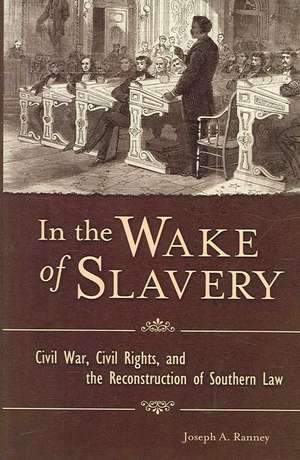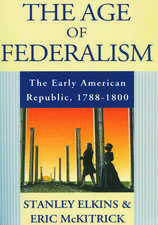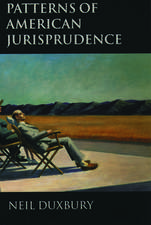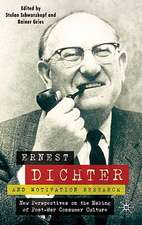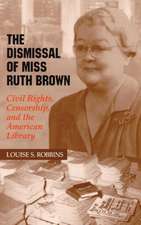In the Wake of Slavery: Civil War, Civil Rights, and the Reconstruction of Southern Law
Autor Joseph A. Ranneyen Limba Engleză Hardback – 29 oct 2006 – vârsta până la 17 ani
Preț: 320.87 lei
Preț vechi: 391.70 lei
-18% Nou
Puncte Express: 481
Preț estimativ în valută:
61.41€ • 63.87$ • 50.69£
61.41€ • 63.87$ • 50.69£
Carte tipărită la comandă
Livrare economică 14-28 aprilie
Preluare comenzi: 021 569.72.76
Specificații
ISBN-13: 9780275989729
ISBN-10: 0275989720
Pagini: 212
Dimensiuni: 156 x 235 x 22 mm
Greutate: 0.47 kg
Editura: Bloomsbury Publishing
Colecția Praeger
Locul publicării:New York, United States
ISBN-10: 0275989720
Pagini: 212
Dimensiuni: 156 x 235 x 22 mm
Greutate: 0.47 kg
Editura: Bloomsbury Publishing
Colecția Praeger
Locul publicării:New York, United States
Notă biografică
Joseph A. Ranney teaches legal history as an adjunct professor at Marquette University Law School and is a partner in the Madison, Wisconsin, law firm of DeWitt Ross & Stevens S.C., practicing commercial and intellectual property litigation.
Cuprins
Acknowledgments Chapter 1 Introduction: The Legal History of Reconstruction Chapter 2 Traveling the Political Dial: Political and Cultural Forces That Shaped Reconstruction-Era Lawmakers Chapter 3 Law and the Wartime South Chapter 4 The Great Wreck of Property: Coming to Grips with Emancipation Chapter 5 Cleaning up after the Confederacy: The New Federalism and Allocation of Losses of War Chapter 6 The Constitutional Legacy of Reconstruction Chapter 7 A Republic of Paupers: Shaping the Individual's Role in the Postwar Economy Chapter 8 The South Confronts Corporations Chapter 9 Reconstruction and Women's Rights Chapter 10 Southern Law during the Bourbon Era (1877-1890) Chapter 11 The Impassable Chasm: Southern Law during the Straight-Out Era (1890-1915) Chapter 12 The Legal Legacy of Reconstruction Notes Bibliography Index
Recenzii
The era of Reconstruction was one of the most tumultuous times in US history, rife with social, economic, and political upheaval. One mechanism that attempted to ease the chaos was the state legal system of the defeated Confederate states. Law professor Ranney presents a broad discussion of the post-Civil War efforts to reestablish state law in the southern states in the aftermath of economic collapse and social emancipation. He attempts to demonstrate that, unlike the general perception of southern law as the instrument of racism and anti-Reconstruction agitation, newly freed African Americans had some influence upon the re-creation of southern law..Recommended. Upper-division undergraduates and above.
Ranney details the diversity of approaches to Reconstruction --from civil punishment of those who fought for the Confederacy to the significant and largely effective efforts to silence black voters and limit their economic rights. The matrix of responses to the war demonstrates how much was unsettled. This is a study of cases and statutes. There are many facts in this study and it will be an important companion to scholars sifting the grains of sand of Reconstruction...There is much to be said about law during Reconstruction; scholars now have a concise and important summary of many of those changes.
This book has much to recommend in it, both to the specialist and the general historian. Its focus on the purely legal aspects of Reconstruction gives it a unique perspective..Ranney offers worthwhile insight into the role of Southern lawmakers, and the judiciary in particular, in the outcome of what Eric Foner calls the unfinished revolution. The most important insight Ranney offers is in the complexity of the judicial process that was far from a simple North versus South or Radical versus Redeemer contest.
Ranney's careful and well-organized study of Reconstruction is an examination of Southern states' responses to the political, economic, and social changes following the civil war. Since the federal government held limited power over the states, he argues, the states were able to rebuild their legal systems in a surprisingly varied evolution that tackled issues of race, property rights, and economic rehabilitation in an effort or reconciliation with a new American legal order. Ranney also profiles key political and legal figures who were at the forefront of their respective states' issues..[t]he lasting legacy of the legal framework would come to fruition nearly 100 years later during the civil rights movement of the twentieth century.
Practicing attorney Ranney shows how the South was in fact not at all unified, and that building a new social order from the ruins of a slave economy was a state-by-state enterprise. He also finds that far from operating under a legal system imposed by the victorious North, Southern courts operated largely independently. Along with the economic issues, which each state handled largely on its own, many courts made surprising rulings toward reunification and civil rights in defiance of Southern legislators. The result is a fascinating account of how the relationship of law and society can be simultaneously interdependent, delicate and complex.
In this succinct treatise on southern law and judicial culture during Reconstruction, attorney Joseph R. Ranney makes the innovative argument that conservative southern judges played important roles in facilitating national reconciliation and in preserving basic civil rights for African Americans.
. . . detailed and meticulously documented. . .
Ranney details the diversity of approaches to Reconstruction --from civil punishment of those who fought for the Confederacy to the significant and largely effective efforts to silence black voters and limit their economic rights. The matrix of responses to the war demonstrates how much was unsettled. This is a study of cases and statutes. There are many facts in this study and it will be an important companion to scholars sifting the grains of sand of Reconstruction...There is much to be said about law during Reconstruction; scholars now have a concise and important summary of many of those changes.
This book has much to recommend in it, both to the specialist and the general historian. Its focus on the purely legal aspects of Reconstruction gives it a unique perspective..Ranney offers worthwhile insight into the role of Southern lawmakers, and the judiciary in particular, in the outcome of what Eric Foner calls the unfinished revolution. The most important insight Ranney offers is in the complexity of the judicial process that was far from a simple North versus South or Radical versus Redeemer contest.
Ranney's careful and well-organized study of Reconstruction is an examination of Southern states' responses to the political, economic, and social changes following the civil war. Since the federal government held limited power over the states, he argues, the states were able to rebuild their legal systems in a surprisingly varied evolution that tackled issues of race, property rights, and economic rehabilitation in an effort or reconciliation with a new American legal order. Ranney also profiles key political and legal figures who were at the forefront of their respective states' issues..[t]he lasting legacy of the legal framework would come to fruition nearly 100 years later during the civil rights movement of the twentieth century.
Practicing attorney Ranney shows how the South was in fact not at all unified, and that building a new social order from the ruins of a slave economy was a state-by-state enterprise. He also finds that far from operating under a legal system imposed by the victorious North, Southern courts operated largely independently. Along with the economic issues, which each state handled largely on its own, many courts made surprising rulings toward reunification and civil rights in defiance of Southern legislators. The result is a fascinating account of how the relationship of law and society can be simultaneously interdependent, delicate and complex.
In this succinct treatise on southern law and judicial culture during Reconstruction, attorney Joseph R. Ranney makes the innovative argument that conservative southern judges played important roles in facilitating national reconciliation and in preserving basic civil rights for African Americans.
. . . detailed and meticulously documented. . .
